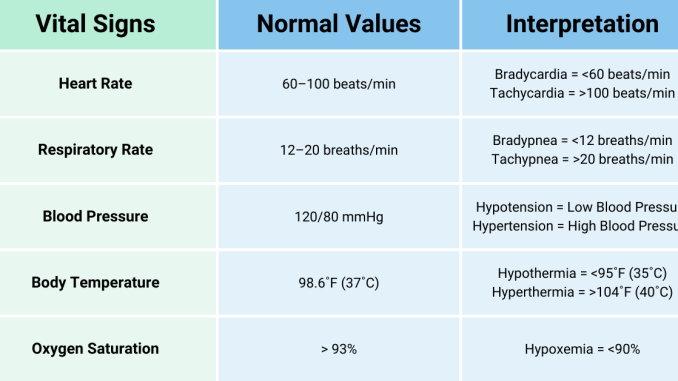
Vital signs are important indicators of your overall health and well-being. By monitoring these key measurements regularly, you can gain valuable insights into how your body is functioning and detect any potential health issues early on. In this article, we will explore the significance of vital signs and what they mean for your health.
What are Vital Signs?
Vital signs are measurements of your body’s basic functions, including temperature, pulse rate, blood pressure, and respiratory rate. These measurements provide valuable information about your cardiovascular, respiratory, and neurological systems, allowing healthcare professionals to assess your health status and detect any abnormalities or deviations from the norm.
Why are Vital Signs Important?
Monitoring vital signs is crucial for ensuring that your body is functioning properly. Changes in vital signs can indicate underlying health issues, such as infections, heart conditions, or respiratory problems. By tracking these measurements regularly, you can identify potential health problems early on and seek appropriate medical intervention if necessary.
Understanding Vital Sign Measurements
Here are some common vital signs and what they can tell you about your health:
Temperature
Body temperature is a key indicator of your body’s metabolic rate and overall health. A high temperature can indicate fever, while a low temperature may suggest hypothermia or other health issues.
Pulse Rate
Your pulse rate, or heart rate, measures the number of times your heart beats per minute. A normal resting heart rate is between 60-100 beats per minute. An elevated heart rate may indicate stress, dehydration, or cardiovascular problems.
Blood Pressure
Blood pressure measures the force of blood against the walls of your arteries. High blood pressure, or hypertension, can increase your risk of heart disease, stroke, and other health complications. Low blood pressure may cause dizziness, fainting, or fatigue.
Respiratory Rate
Your respiratory rate measures the number of breaths you take per minute. A normal respiratory rate is between 12-16 breaths per minute. Changes in respiratory rate can indicate respiratory problems, such as asthma, pneumonia, or lung disease.
How to Monitor Your Vital Signs
Monitoring your vital signs regularly can help you stay on top of your health and identify any potential issues early on. Here are some tips for monitoring your vital signs at home:
Invest in a home blood pressure monitor to track your blood pressure regularly.
Use a digital thermometer to measure your body temperature accurately.
Check your pulse rate by placing two fingers on your wrist or neck and counting the number of beats in 60 seconds.
Monitor your respiratory rate by counting the number of breaths you take in one minute.
When to Seek Medical Attention
If you notice any significant changes in your vital signs or experience symptoms such as chest pain, shortness of breath, dizziness, or fainting, seek medical attention immediately. These could be signs of a serious health issue that requires prompt intervention.
Conclusion
Understanding vital signs and what they mean for your health is essential for maintaining your well-being and detecting any health issues early on. By monitoring your vital signs regularly and seeking medical attention when needed, you can take proactive steps to protect your health and ensure a long and healthy life.
Remember, your health is your most valuable asset, so don’t ignore the signs that your body is trying to tell you. Take charge of your health and make monitoring your vital signs a priority.
